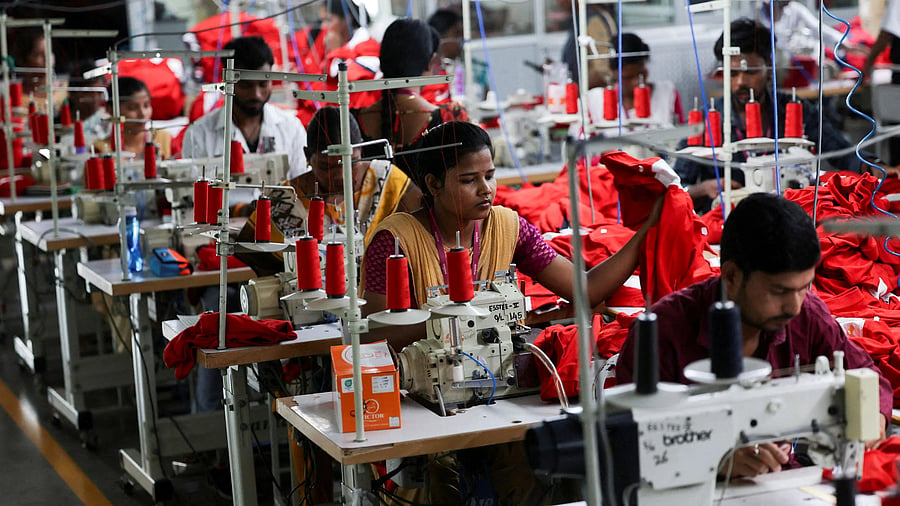
People work at a garment factory.
Credit: Reuters Photo
Bengaluru: The Indian textile industry has started facing the heat of US tariffs. With the first tranche of 25% tariffs coming into effect on August 7, the US buyers of textile goods from India have paused lifting goods and have also put on hold new orders.
Experts and industry executives DH spoke to, underscored the distress this has created in the sector.Textile majors like Gokaldas Exports are exploring diversification options, including building manufacturing facilities across continents and exploring newer markets. They are also hoping that the Free Trade Agreement (FTA) with the UK will come to their rescue.
Commenting on the development, Premal Udani, Past Chairman, Apparel Export Promotion Council (AEPC) and Managing Director, Kaytee Corp Pvt Ltd, said, “This is an existential crisis for the apparel and textile industry. Current effective duties along with additional tariffs is approx 40% which will go up to 65% post August 27. The US buyers have paused the lifting of goods and have also put on hold new order placements. We hope that the current impasse is resolved as early as possible otherwise the industry is looking at order cancellations/ factory closures and many other consequences thereof.”
Players such as Gokaldas Exports feel their Africa business might be at an advantageous position with 10% US reciprocal tariffs on both Kenya and Ethiopia, and are working towards an active engagement with clients on the same.
Sivaramakrishnan Ganapathi, Managing Director and Vice Chairman of Gokaldas Exports, said: “Over the last few years we have tried to de-risk our business model by expanding our product range and building manufacturing facilities across continents, in India and Africa and have focused on agility to be able to quickly add production capacity in any location. We have also started to diversify the markets where we sell, and the FTA with the UK will be a big help.”
The imposition of steep tariffs of 50% on Indian textile & clothing exports, will be a serious setback, as USA is the single largest market for this sector. Exports are likely to be severely affected as and when the full scale of the tariffs and any other secondary tariffs come into force, said Dr Siddhartha Rajagopal, Executive Director, The Cotton Textiles Export Promotion Council (TEXPROCIL) said.
“The textile industry is working in close cooperation with the Government to mitigate the impact of the tariffs in the best possible manner in order to maintain the momentum of exports in these rather shocking times”, he said.
A. Ravikumar, Executive Director, Manmade Fibre and Technical Textiles Export Promotion Council (MATEXIL), said the US tariff order has come as a shock to the exporters. Effectively with 50% tariffs, no textile products can be exported to the United States as neither the exporter nor the buyer are in a position to absorb such a high tariff.
Exporters are now hoping for reduction in duties in the next 21 days after which the penal tariff rate will become effective.
For Indian textile and apparel exporters, the consequences are immediate and striking: they are now confronting a significant competitive disadvantage in the US market. As other countries like Bangladesh and Vietnam offer more favourable tariffs, there is a strong likelihood that buyers will pivot towards these alternative sources, further intensifying the challenge for Indian exporters, said Ayush A Mehrotra, Partner at Khaitan & Co.
“Indian businesses must act with agility—scrutinising contracts for opportunities to negotiate price adjustments or pass on tariffs, particularly when risk allocation under Incoterms (international commercial terms) is ambiguous. It is essential to evaluate any risks of early contract termination carefully to mitigate exposure and ensure business sustainability,” he said.
The recently announced Indo-UK FTA offers a 12% duty advantage over China and puts India on par with Bangladesh, creating a strong export potential. The trade deal with the EU could open significant opportunities for Indian apparel exporters, Ganapathi said.